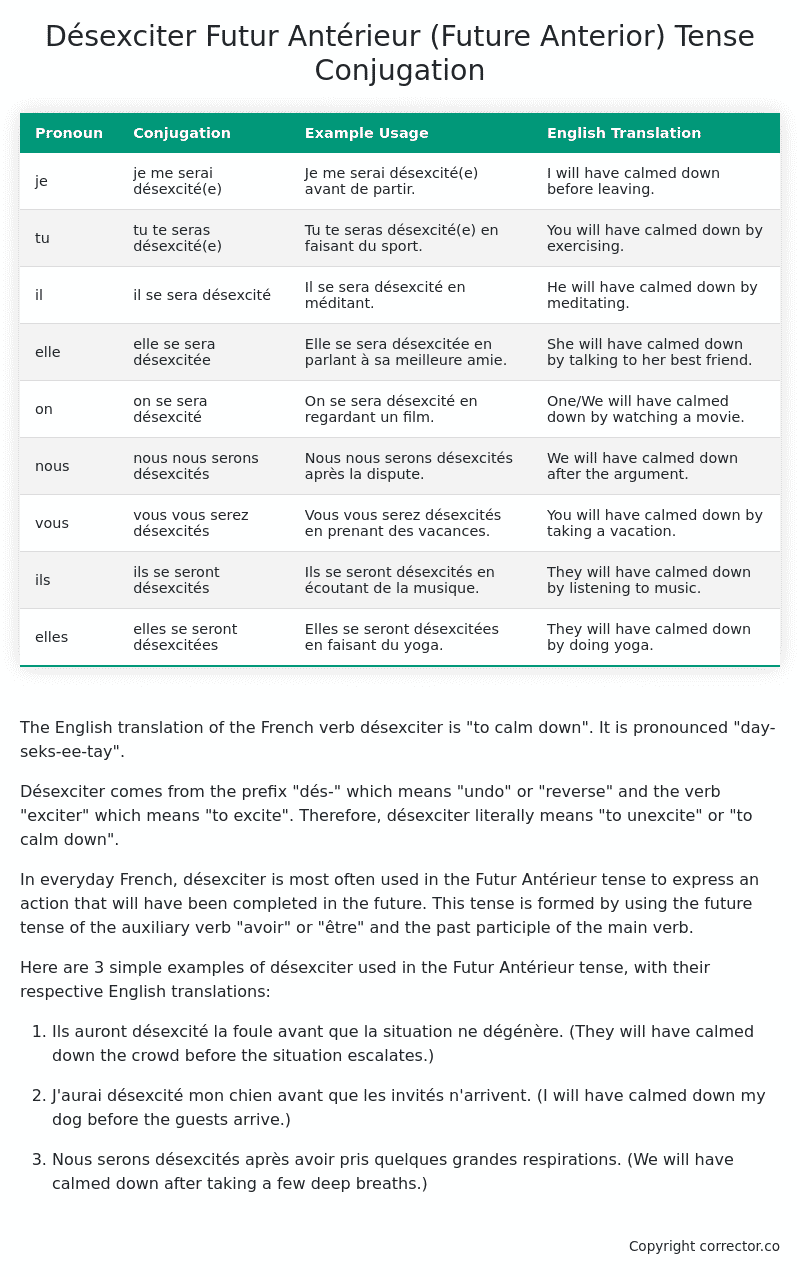Futur Antérieur (Future Anterior) Tense Conjugation of the French Verb désexciter
Introduction to the verb désexciter
The English translation of the French verb désexciter is “to calm down”. It is pronounced “day-seks-ee-tay”.
Désexciter comes from the prefix “dés-” which means “undo” or “reverse” and the verb “exciter” which means “to excite”. Therefore, désexciter literally means “to unexcite” or “to calm down”.
In everyday French, désexciter is most often used in the Futur Antérieur tense to express an action that will have been completed in the future. This tense is formed by using the future tense of the auxiliary verb “avoir” or “être” and the past participle of the main verb.
Here are 3 simple examples of désexciter used in the Futur Antérieur tense, with their respective English translations:
-
Ils auront désexcité la foule avant que la situation ne dégénère. (They will have calmed down the crowd before the situation escalates.)
-
J’aurai désexcité mon chien avant que les invités n’arrivent. (I will have calmed down my dog before the guests arrive.)
-
Nous serons désexcités après avoir pris quelques grandes respirations. (We will have calmed down after taking a few deep breaths.)
Table of the Futur Antérieur (Future Anterior) Tense Conjugation of désexciter
| Pronoun | Conjugation | Example Usage | English Translation |
|---|---|---|---|
| je | je me serai désexcité(e) | Je me serai désexcité(e) avant de partir. | I will have calmed down before leaving. |
| tu | tu te seras désexcité(e) | Tu te seras désexcité(e) en faisant du sport. | You will have calmed down by exercising. |
| il | il se sera désexcité | Il se sera désexcité en méditant. | He will have calmed down by meditating. |
| elle | elle se sera désexcitée | Elle se sera désexcitée en parlant à sa meilleure amie. | She will have calmed down by talking to her best friend. |
| on | on se sera désexcité | On se sera désexcité en regardant un film. | One/We will have calmed down by watching a movie. |
| nous | nous nous serons désexcités | Nous nous serons désexcités après la dispute. | We will have calmed down after the argument. |
| vous | vous vous serez désexcités | Vous vous serez désexcités en prenant des vacances. | You will have calmed down by taking a vacation. |
| ils | ils se seront désexcités | Ils se seront désexcités en écoutant de la musique. | They will have calmed down by listening to music. |
| elles | elles se seront désexcitées | Elles se seront désexcitées en faisant du yoga. | They will have calmed down by doing yoga. |
Other Conjugations for Désexciter.
Le Present (Present Tense) Conjugation of the French Verb désexciter
Imparfait (Imperfect) Tense Conjugation of the French Verb désexciter
Passé Simple (Simple Past) Tense Conjugation of the French Verb désexciter
Passé Composé (Present Perfect) Tense Conjugation of the French Verb désexciter
Futur Simple (Simple Future) Tense Conjugation of the French Verb désexciter
Futur Proche (Near Future) Tense Conjugation of the French Verb désexciter
Plus-que-parfait (Pluperfect) Tense Conjugation of the French Verb désexciter
Passé Antérieur (Past Anterior) Tense Conjugation of the French Verb désexciter
Futur Antérieur (Future Anterior) Tense Conjugation of the French Verb désexciter (this article)
Subjonctif Présent (Subjunctive Present) Tense Conjugation of the French Verb désexciter
Subjonctif Passé (Subjunctive Past) Tense Conjugation of the French Verb désexciter
Subjonctif Imparfait (Subjunctive Imperfect) Tense Conjugation of the French Verb désexciter
Subjonctif Plus-que-parfait (Subjunctive Pluperfect) Tense Conjugation of the French Verb désexciter
Conditionnel Présent (Conditional Present) Tense Conjugation of the French Verb désexciter
Conditionnel Passé (Conditional Past) Tense Conjugation of the French Verb désexciter
L’impératif Présent (Imperative Present) Tense Conjugation of the French Verb désexciter
L’infinitif Présent (Infinitive Present) Tense Conjugation of the French Verb désexciter
Struggling with French verbs or the language in general? Why not use our free French Grammar Checker – no registration required!
Get a FREE Download Study Sheet of this Conjugation 🔥
Simply right click the image below, click “save image” and get your free reference for the désexciter Futur Antérieur tense conjugation!

Désexciter – About the French Futur Antérieur (Future Anterior) Tense
Construction
Common Everyday Usage Patterns
Interactions with Other Tenses
For example
Summary
I hope you enjoyed this article on the verb désexciter. Still in a learning mood? Check out another TOTALLY random French verb conjugation!


